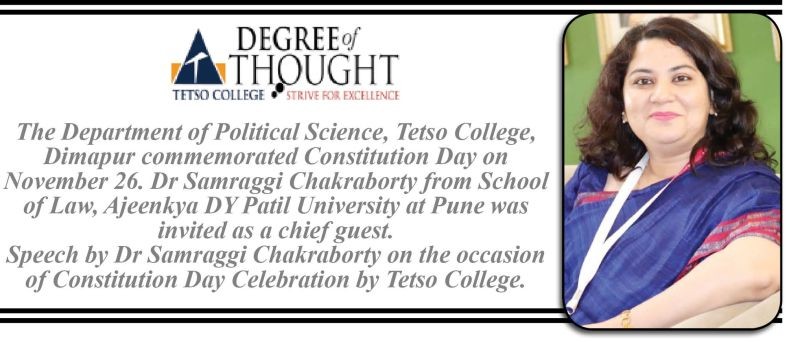
At the outset, I would like to extend my greetings to everyone on the occasion of Constitution Day. It is a matter of pride and great joy as India celebrates its 71st Constitution Day. In the words of Justice Krishna Iyer “The Constitution of India is not only the supreme law of the Land but it is indeed a way of life.” November 26, 1949 marked a new beginning for India as the Constitution of India was adopted by the Constituent Assembly on that day. The Constituent Assembly was constituted in November, 1946 for the purpose of framing the Constitution. This Constituent Assembly created on 29th August, 1947 a Drafting Committee that would consider the draft of the Constitution. The chairman of the drafting committee was Dr. B.R. Ambedkar. The draft of the Indian Constitution was completed and adopted on 26th January, 1950. The framers of the Indian Constitution framed a Constitution that actually upheld and fulfilled the cherished ideals of the people. The Constitution of India which is the largest written Constitution in the world basically lays down a framework that deals with power, structure, procedure and duty of a government; talks about the fundamental rights, directive principles, fundamental duties. The Preamble to the Constitution talks about the principles, ideals and objectives of the Constitution of India. It is in the people of India on whom the custody of the Constitution is vested. The Preamble says that the Constitution derives its authority from “We, the people of India”. The Preamble is a key to the Constitution. However, it is interesting to know that even though Preamble is mentioned in the beginning, it was drafted at the last by the Constituent Assembly. The Preamble to Constitution guarantees to all Indian citizens “Justice- social, economic and political”. It sets up Justice, liberty, equality and fraternity as its objectives. The Preamble declares India to be a sovereign, socialist, secular democratic republic. The Constitution of India ensured us fundamental freedoms. The Constitution of India under Part III (which deals with fundamental rights) essentially guarantees and protects our human rights. During colonial rule in our country, there were gross violations of human rights. The freedoms mentioned under Part III basically aims to keep the citizens and their rights at the center stage. The very purpose of providing fundamental rights was to instill in the people a sense of security and confidence. The members of the Constituent Assembly were very keen on introducing fundamental rights in the Constitution. The fundamental rights are necessary outcomes of the Preamble which declares that People of India have solemnly resolved to constitute India into a sovereign, democratic, republic and to secure to all its citizens justice - social economic and political; liberty of thought, expression, belief, faith and worship; equality of status and opportunity. One very important fundamental right is the right to equality. Right to equality is one of the cornerstones of the Indian Constitution. The underlying object of Article 14 is to secure to all persons the equality of status and opportunity as mentioned in the Preamble. The concept of equality in Article 14 means legal equality. There are two concepts which are involved in Article 14 and these are ‘equality before law’ and ‘equal protection of laws’. ‘Equality before law’ ensures that there is no special privilege to anyone and that all are equally subjected to the law of the land irrespective of their status. This is however not an absolute guarantee as there are exceptions to it. The second concept ‘equal protection of laws’ does not postulate an equal treatment of all persons. It rather implies that ‘like should be treated alike’ without any discrimination. One more important aspect that the Constitution of India talks about is ‘Justice’. This concept of justice is not confined to our understanding of courtroom adjudication. Rather, justice is seen as having implications in varied fields be it economic, political or social. If we talk about social justice then that denotes that equal treatment should be meted out to all citizens without any social discrimination. Pt Jawaharlal Nehru put an idea before the Constituent Assembly “First work of this assembly is to make India independent by a new Constitution through which starving people will get complete meals and clothes, and each Indian will get the best option that he can progress himself.” If we talk about political justice, then it implies the equal participation in the political process by all adults. With regard to economic justice, it means that there should be non-discrimination between people on the basis of any economic factor. The framing and adoption of the Constitution of India was indeed a revolutionary event in the history of India. As citizens, we should pledge to uphold and respect this cherished document. With these words, I end my speech.
Degree of Thought is a weekly community column initiated by Tetso College in partnership with The Morung Express. Degree of Thought will delve into the social, cultural, political and educational issues around us. The views expressed here do not reflect the opinion of the institution. Tetso College is a NAAC Accredited UGC recognised Commerce and Arts College. The editors are Dr Hewasa Lorin, Dr Aniruddha Babar, Nisha Dahiya and Meren. For feedback or comments please email: dot@tetsocollege.org






